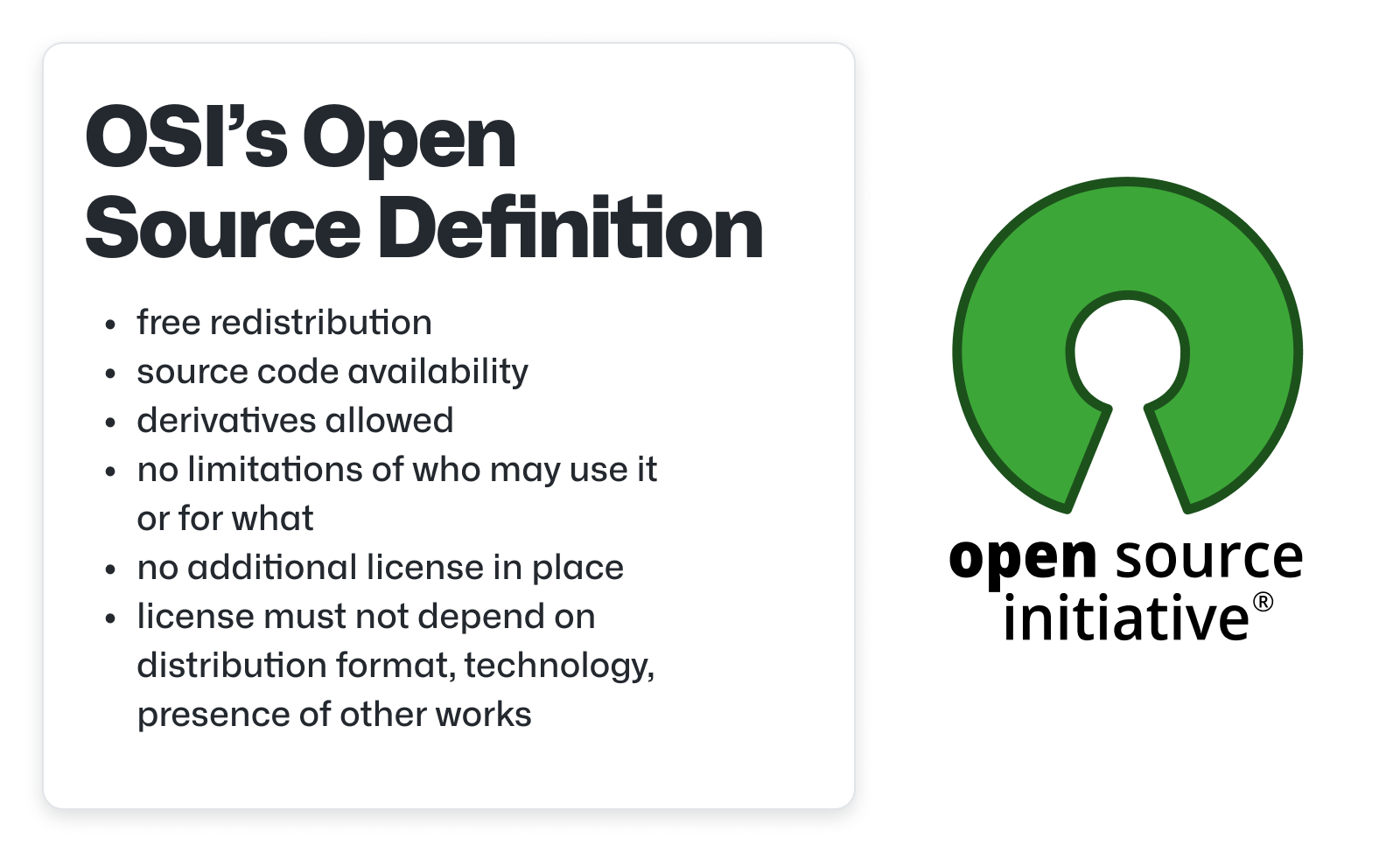
Information flow is what the Internet is about. Information sharing is power. If you don't share your ideas, smart people can't do anything about them, and you'll remain anonymous and powerless.
Vint Cerf
The concept of open source is usually associated with software development, but in recent years, more businesses are realising its potential beyond just tech—it’s a mindset and way of thinking!
Open source principles—such as collaboration, transparency, and sharing knowledge—can provide a significant competitive edge for businesses operating in the complex and competitive world we live in today.
Continue reading as we explore how open source for business is not just a trend but a proven approach for driving innovation and long-term success.
What Does "Open Source for Business" Really Mean?
At its core, open source refers to a model where products, information, and resources are made freely available for anyone to use, modify, and share.
This approach originated in the software world, but the principles behind it are equally relevant to businesses in any industry. When we talk about open source for business, we’re discussing the idea of applying these same practices to organisational culture, decision-making, and even product development.
By adopting an open source mindset, businesses can break down the traditional silos that often hinder progress. It promotes openness, where employees, customers, and even competitors can contribute ideas, challenge assumptions, and improve outcomes.

Source: https://github.com/readme/guides/open-source-licensing
Taking inspiration from the above definition, we can identify some “open source for business” guiding principles:
Free exchange of ideas and resources: Businesses encourage the unrestricted sharing of knowledge, tools, and best practices with other organisations or partners.
Transparency in operations: All processes, strategies, and information are open and accessible to stakeholders, clients, and collaborators for mutual benefit.
Collaboration encouraged: Derivative projects, ideas, and improvements can be freely developed by anyone, without restrictions on who can contribute or enhance business practices.
No barriers to participation: Businesses place no limitations on who can engage in partnerships, collaborations, or knowledge sharing, regardless of size, industry, or location.
No hidden agreements: Partnerships and collaborations operate without the need for additional, restrictive licenses or confidential agreements.
Equal access to shared knowledge: Business practices must not depend on proprietary methods or hidden technologies. All participants can access, modify, and redistribute information regardless of platform or industry standards.
The Benefits of Adopting Open Source Principles in the Businesses World
Adopting open source principles can provide several tangible and intangible benefits for businesses:
Collaboration: In open source projects, teams work together across different locations and organisations, sharing knowledge and skills. Businesses can use this same approach to foster stronger internal collaboration between departments or even external partnerships.
Innovation: When ideas flow freely, they can evolve and improve at a faster pace. An open-source approach encourages innovation, allowing businesses to benefit from the collective creativity and expertise of a broader network.
Cost Efficiency: Just like open source software often provides a more affordable alternative to proprietary solutions, an open business model can reduce costs. Whether it’s through sharing resources, leveraging open-source tools, or pooling efforts with partners, costs can be minimised without sacrificing quality.
Transparency as a Key Driver of Trust
In a traditional open source software development project, everyone has access to the code, documentation, and the changes made along the way. This same level of openness and transparency can be applied to business practices as well.
By being transparent with customers, stakeholders, and even employees, businesses can build stronger relationships that increase trust. When customers and the wider team understand how decisions are made, or when a company is upfront about its challenges and successes, it creates a sense of honesty that builds loyalty. On the other hard, when a business appears guarded or secretive, it tends to create distrust and often results in the loss of confidence.
In a world where trust is hard to come by, transparency is a huge advantage and something we consider as an integral part of our approach at Opace. See here and here for example to understand how customers regard our service.
Sharing Knowledge: Moving Away from the Old Competitive Model
Traditional business models often emphasise secrecy and competition. But in the open source world, knowledge is meant to be shared, not hoarded.
This shift in thinking is essential if businesses want to stay relevant in a world that thrives on collaboration, especially a world that is becoming dominated by AI tools to drive productivity.
When businesses share their knowledge—whether it’s industry insights, product strategies, or even internal best practices—they gain access to the shared knowledge of others in return. This approach allows for a collective improvement across industries, benefiting everyone involved.
While it may seem counterintuitive to give away valuable information, the reality is that sharing creates more opportunities for collaboration and growth.
Real-World Examples of Open Source Success Stories
Tesla’s Open Patent Initiative
In 2014, Tesla announced that it would allow other companies to use its electric vehicle patents for free.
Elon Musk believed that by sharing Tesla’s advancements, the entire electric vehicle industry would benefit and grow faster.
This move has encouraged more innovation and collaboration in the EV market while reducing barriers to entry for other manufacturers.
In the long run, it has helped establish Tesla as a leader while accelerating the transition to sustainable energy.
Red Hat and the Open Source Software Movement
Red Hat is one of the most successful companies that built a business model around open source.
Red Hat contributes to open source communities, sharing improvements in software with the world.
In return, the company has built a thriving business by offering support, consulting, and custom solutions around that shared technology.
The growth of Red Hat demonstrates how sharing technology can lead to commercial success through collaboration and building trust.
GitHub and the Open Source Development Model
GitHub, the platform for software development, has become a hub for open source projects.
By providing a space where developers can freely share and improve upon each other’s code, GitHub encourages collaboration on a global scale.
Many businesses, including Microsoft, have embraced open-source development on GitHub, realizing that sharing code can lead to faster, more robust innovation while building a community of contributors.
Meta’s LLaMA in AI (Large Language Model Meta AI)
One significant example of open source in artificial intelligence is Meta’s LLaMA. Released in 2023, LLaMA is a family of LLMs designed to democratise AI research by allowing researchers and developers to access and build on the model freely.
Unlike closed models like OpenAI’s GPT, LLaMA has fostered collaborative improvements and experimentation, contributing to faster advancements in natural language processing (NLP) and AI research overall.
These are just some examples that clearly demonstrate how sharing valuable information or intellectual property can open doors to collaboration, ultimately leading to business growth and long-term success.
Creating a Collaborative Future
The open-source philosophy is ultimately about creating a culture of collaboration and continuous improvement. As businesses increasingly embrace digital transformation and seek ways to adapt to global markets, those that adopt open source principles will be better positioned for success.
By prioritising collaboration, transparency, and knowledge-sharing, businesses can stay ahead of the curve, innovating faster and making more informed decisions.
In the long run, applying open source principles to business is a winning strategy that promotes growth, efficiency, and a more sustainable approach to doing business.

Open Source Values: The Key to Staying Relevant and Competitive
The approach of adopting open source for business encourages companies to adopt the same values that have made open source software so successful: openness, collaboration, and sharing.
When these principles are applied to business practices, they foster innovation, trust, and long-term success in ways traditional models often fail to achieve. As the business world continues to evolve, adopting an open source philosophy may just be the key to staying relevant and competitive.
